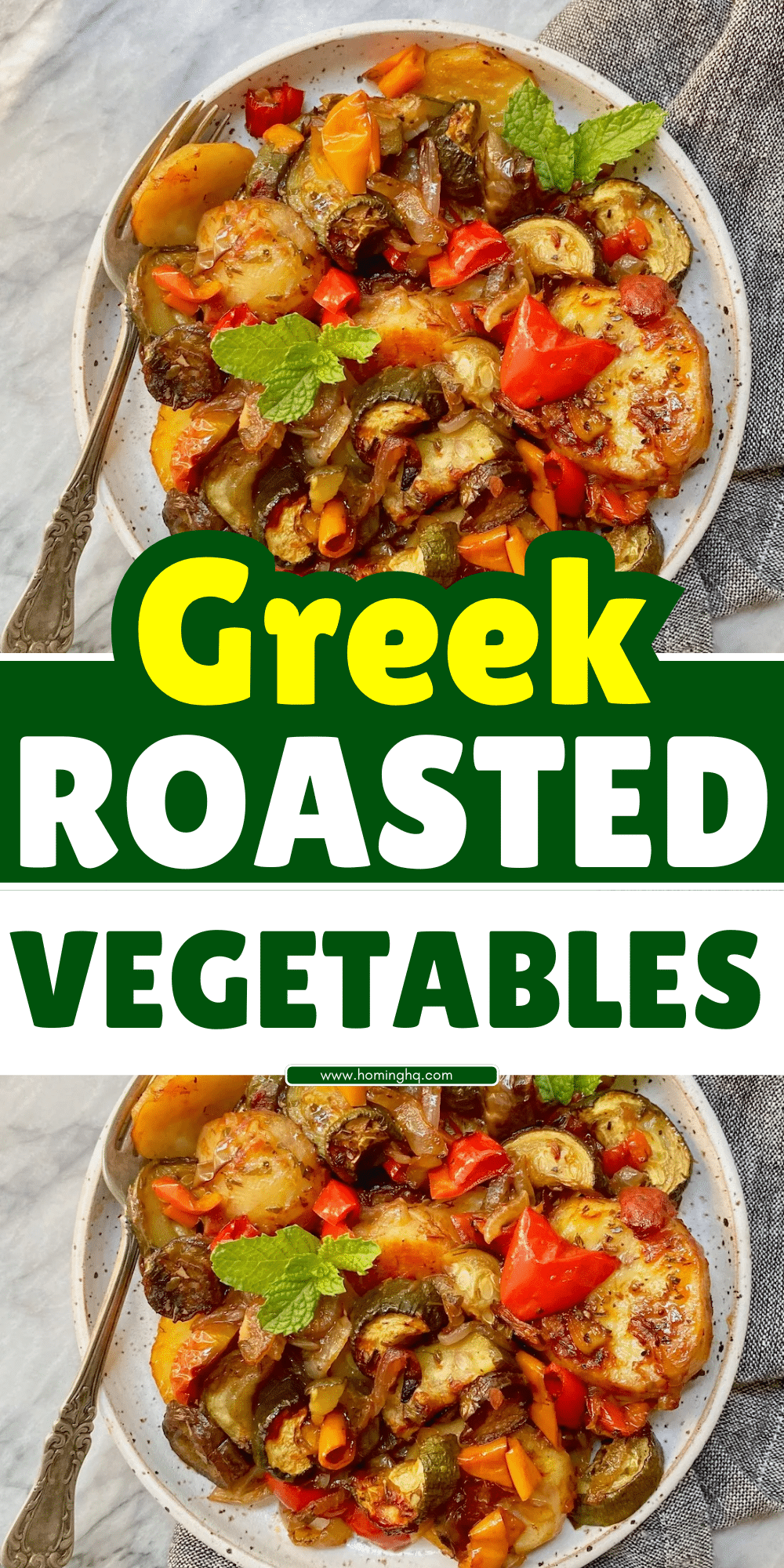Greek Roasted Vegetables are a vibrant, Mediterranean-inspired dish that’s packed with fresh flavors and simple, wholesome ingredients.
A perfect addition to any meal, this dish brings together a variety of seasonal vegetables roasted to perfection, infused with the aromatic blend of Greek herbs and the richness of extra virgin olive oil.
Whether you’re serving it as a side dish or enjoying it as the main course, Greek Roasted Vegetables are not only delicious but also offer numerous health benefits, making them a great choice for any occasion.

Why You’ll Love Greek Roasted Vegetables
Greek Roasted Vegetables are the epitome of what makes Mediterranean cuisine so beloved: fresh, wholesome, and bursting with natural flavors.
This dish is both incredibly easy to prepare and full of satisfying textures. From the crisp edges of roasted potatoes to the tender zucchini and juicy tomatoes, every bite offers a balance of savory and aromatic notes.
The versatility of Greek Roasted Vegetables also makes it a standout.
You can pair it with any protein—grilled chicken, fish, or lamb—or enjoy it as a vegan main course with a side of quinoa or chickpeas.
Plus, this dish is naturally gluten-free and loaded with vitamins, antioxidants, and fiber, making it an ideal option for anyone looking to eat more healthfully without sacrificing taste.
What Makes Greek Roasted Vegetables So Special?

Greek Roasted Vegetables are special because they celebrate the rich culinary traditions of Greece, where fresh, local produce is at the heart of every dish.
The combination of Mediterranean vegetables—such as tomatoes, zucchini, eggplant, and peppers—roasted with aromatic herbs and the finest extra virgin olive oil creates a dish that is both simple and sophisticated.
The magic of this recipe lies in its balance.
The olive oil lends a luxurious richness, while the herbs like oregano and thyme provide that signature Greek flavor. Garlic, lemon, and even a hint of cinnamon elevate the vegetables, making them irresistible.
This dish reflects the essence of Greek cooking, where ingredients shine on their own, brought together by the careful use of seasoning.
Key Ingredients for Greek Roasted Vegetables
To make Greek Roasted Vegetables, you’ll need a few key ingredients that are staples in Greek cuisine:
Seasonal Vegetables
- Tomatoes: Juicy and sweet, tomatoes are the perfect base for the dish.
- Bell Peppers: Their slightly sweet flavor complements the other veggies.
- Zucchini: Adds tenderness and a mild, slightly nutty taste.
- Eggplant: Offers a rich texture and a slightly smoky flavor when roasted.
- Red Onions: Their sweetness intensifies as they roast, adding depth.
- Potatoes: Provide a hearty base and absorb the flavors of the herbs and olive oil beautifully.
Herbs and Spices
- Oregano: A staple herb in Greek cooking, lending an earthy, slightly peppery flavor.
- Thyme: Adds a subtle, fragrant note to the vegetables.
- Garlic: Offers aromatic richness and a savory depth.
- Salt and Pepper: Basic seasoning that enhances the overall flavors.
- Cinnamon: A surprising yet traditional touch that adds warmth and complexity.
Olive Oil
- Extra Virgin Olive Oil: The heart of this dish, adding richness and helping the vegetables caramelize to perfection.
Lemon
- Fresh Lemon Juice: Adds a burst of citrusy brightness that balances the richness of the olive oil and complements the savory vegetables.
How to Prepare Greek Roasted Vegetables
Step 1: Preheat Your Oven
Begin by preheating your oven to 400°F (200°C). This high temperature ensures that the vegetables roast properly, developing a golden, caramelized exterior while remaining tender inside.
Step 2: Prepare the Vegetables
Wash and peel (if needed) your vegetables. For even cooking, chop them into uniform pieces. Cut the potatoes into small cubes, slice the eggplant and zucchini into rounds or half-moons, and chop the peppers and onions into chunks. You want all the vegetables to roast evenly, so consistency in size is key.
Step 3: Season the Vegetables
Place your chopped vegetables in a large mixing bowl. Drizzle extra virgin olive oil over them generously, ensuring each piece is well-coated. Add oregano, thyme, garlic, salt, and pepper, tossing everything together so that the herbs and spices are evenly distributed. For a subtle hint of sweetness, add a pinch of cinnamon.
Step 4: Roast to Perfection
Transfer the seasoned vegetables to a baking sheet lined with parchment paper. Spread them out in a single layer, ensuring they aren’t overcrowded, as this will allow for proper caramelization. Roast for about 30 to 40 minutes, stirring halfway through, until the vegetables are tender and golden brown. The edges should be slightly crispy, and the flavors will have melded together beautifully.
By following these steps, you’ll have a dish that is both flavorful and visually appealing, with vegetables that are perfectly roasted and bursting with Mediterranean goodness.
Tips for the Best Greek Roasted Vegetables
To elevate your Greek Roasted Vegetables to perfection, here are a few tips to ensure they come out crispy, flavorful, and visually stunning:
Use High-Quality Olive Oil
The flavor of olive oil plays a crucial role in this dish, so it’s essential to use extra virgin olive oil for the best taste. High-quality olive oil will not only enhance the vegetables’ flavor but also help them roast evenly and achieve that perfect golden color.
Don’t Overcrowd the Pan
When roasting vegetables, it’s important not to overcrowd the baking sheet. Overcrowding can cause the vegetables to steam instead of roast, leading to a soggier texture. Ensure the vegetables are spread out in a single layer to allow for proper caramelization.
Cut Vegetables to a Uniform Size
For even roasting, cut the vegetables into uniform pieces. If some pieces are much larger than others, they’ll cook at different rates, which can lead to uneven textures. Aim for similarly sized chunks or slices to ensure consistency.
Stir Halfway Through Cooking
To achieve evenly roasted vegetables, give them a gentle stir halfway through the cooking time. This will ensure that all sides of the vegetables are exposed to the heat, helping them develop a crispy, caramelized exterior.
Taste and Adjust Seasoning
Before roasting, taste a small piece of a vegetable after seasoning and adjust accordingly. You may want to add more herbs or a dash of salt to enhance the flavors further.
Serving Suggestions for Greek Roasted Vegetables
Greek Roasted Vegetables can be served in many different ways, making them a versatile addition to any meal. Here are some great ideas for how to enjoy them:
As a Side Dish
Greek Roasted Vegetables pair wonderfully with grilled meats, such as lamb, chicken, or fish. They also complement Mediterranean staples like grilled halloumi cheese or a roasted chicken. The bold, herbaceous flavors of the vegetables will balance out the richness of the meats, creating a satisfying, well-rounded meal.
As a Main Course
For a lighter, vegetarian meal, Greek Roasted Vegetables can stand alone as the main course. Serve them with a side of quinoa, couscous, or rice to make a complete dish. You can also top the vegetables with a dollop of tzatziki sauce or sprinkle with crumbled feta cheese for extra creaminess and tang.
In a Salad
For a warm, hearty salad, toss your roasted vegetables with some mixed greens, olives, and a lemon vinaigrette. You can even add some chickpeas for additional protein, creating a filling, Mediterranean-inspired salad.
With Pita and Dips
Serve your roasted vegetables as a part of a Mediterranean appetizer spread. Pair them with fresh pita bread and a variety of dips like hummus, baba ganoush, or tzatziki for a flavorful start to any meal.
Variations on Greek Roasted Vegetables
While the classic version of Greek Roasted Vegetables is a crowd-pleaser, there are plenty of ways to tweak the recipe and experiment with new flavors. Here are a few variations to try:
Add Protein for a Complete Meal
Transform the dish into a heartier meal by adding chickpeas or lentils for a plant-based protein boost. These can be roasted alongside the vegetables or added at the end for a satisfying vegetarian main dish. If you prefer a meat option, consider adding chicken thighs or lamb chops, which can be roasted in the same pan with the vegetables.
Try Different Herbs
While oregano and thyme are traditional in Greek cooking, feel free to experiment with other Mediterranean herbs. Rosemary adds an earthy, pine-like flavor that pairs beautifully with the roasted vegetables. Basil or parsley can bring a fresh, herbal note to the dish, or try a pinch of mint for a slightly unexpected, refreshing twist.
Spicy Version
For those who enjoy a little heat, try adding some red pepper flakes or even fresh chili peppers to the mix. The mild heat from the chili peppers will complement the savory flavors of the vegetables without overpowering them.
Incorporate Root Vegetables
To make the dish heartier, add carrots, parsnips, or sweet potatoes. These root vegetables roast beautifully and absorb the seasoning just as well as the classic vegetables. They also add a slightly sweet flavor that balances out the savory notes of the other ingredients.
Add a Touch of Sweetness
For a subtle sweetness, toss in some dried cranberries or raisins towards the end of roasting. The sweetness will contrast with the savory vegetables, creating an intriguing balance of flavors.
By mixing and matching these variations, you can create a Greek Roasted Vegetables dish that suits your tastes and dietary needs perfectly. The possibilities are endless, and each version brings out a unique take on the Mediterranean flavors that make this recipe so delicious.
Storage and Reheating Tips
If you have leftovers of your Greek Roasted Vegetables, don’t worry—they store beautifully and are perfect for enjoying later. Here’s how to keep them fresh and tasty:
How to Store Greek Roasted Vegetables
Once your vegetables have cooled to room temperature, transfer them to an airtight container. Stored in the refrigerator, they will last for up to 3-4 days. If you’d like to extend their shelf life, you can freeze the roasted vegetables for up to 1-2 months. However, freezing may affect their texture slightly, so they are best enjoyed fresh.
Reheating Instructions
To bring back the crispiness when reheating, place the vegetables on a baking sheet and heat them in a preheated oven at 375°F (190°C) for about 10-15 minutes. This will help retain their roasted texture. You can also reheat them on a skillet over medium heat, stirring occasionally to ensure they warm up evenly.
If you’re in a rush, you can microwave the vegetables, but note that they might lose some of their crispy edges. Microwave in short intervals (30 seconds at a time) to ensure they are heated thoroughly without becoming soggy.
Conclusion
Greek Roasted Vegetables are a delicious, versatile dish that brings together the best of Mediterranean flavors. Whether served as a side dish, main course, or added to a salad, this recipe will brighten up any meal with its vibrant colors and bold tastes. It’s easy to prepare, customizable, and offers a healthy, satisfying way to enjoy seasonal vegetables. Plus, with the tips and variations provided, you can make this dish your own every time you cook it.
So, gather your ingredients, preheat your oven, and enjoy the hearty goodness of Greek Roasted Vegetables at your next meal. With its rich flavors and endless possibilities, this dish is sure to become a favorite in your recipe rotation!
Frequently Asked Questions (FAQs)
1. Can I use different vegetables for Greek Roasted Vegetables?
Absolutely! While the traditional recipe uses tomatoes, zucchini, eggplant, peppers, onions, and potatoes, you can easily swap in other seasonal vegetables like carrots, parsnips, or sweet potatoes. Just be sure to cut them into similar sizes for even roasting.
2. Can I make Greek Roasted Vegetables ahead of time?
Yes! You can prepare the vegetables ahead of time by chopping them and seasoning them with olive oil and herbs. Store them in the fridge for up to a day before roasting. Alternatively, you can roast them in advance and reheat when you’re ready to serve.
3. Can I add cheese to the roasted vegetables?
Yes! Greek Roasted Vegetables are delicious when topped with crumbled feta cheese after roasting. You can also sprinkle some parmesan or add a dollop of tzatziki sauce for a creamy and tangy finish.
4. How do I make the dish spicier?
To add some heat to your Greek Roasted Vegetables, try incorporating red pepper flakes or fresh chili peppers into the seasoning mix. Adjust the amount based on your desired spice level.
5. Can I freeze Greek Roasted Vegetables?
While it’s possible to freeze Greek Roasted Vegetables, the texture may change slightly upon reheating. If you plan to freeze them, make sure to store them in an airtight container or freezer bag. When you’re ready to eat, simply reheat in the oven for the best results.

Greek Roasted Vegetables
Equipment
- 1 Baking sheet
- 1 large mixing bowl
- 1 Sharp knife
- 1 Cutting Board
- 1 Parchment paper (optional)
- 1 Spoon or spatula (for tossing vegetables)
Ingredients
- 2 tbsp Extra virgin olive oil
- 2 medium Potatoes peeled and diced
- 1 Zucchini sliced
- 1 Eggplant sliced
- 2 Bell peppers chopped
- 1 Red onion chopped
- 2 Tomatoes chopped
- 2 cloves Garlic minced
- 1 tbsp Fresh oregano or 1 tsp dried oregano
- 1 tsp Fresh thyme or ½ tsp dried thyme
- 1/4 tsp Ground cinnamon
- Salt and pepper to taste
- 1 tbsp Lemon juice optional
Instructions
- Preheat the oven to 400°F (200°C).
- Prepare the vegetables: Wash and peel (if necessary) the potatoes, zucchini, eggplant, and red onion. Dice the potatoes, slice the zucchini and eggplant, and chop the peppers, tomatoes, and onion into even pieces.
- Season the vegetables: Place the vegetables in a large mixing bowl. Add the olive oil, oregano, thyme, garlic, cinnamon, salt, and pepper. Toss well to ensure everything is evenly coated.
- Roast the vegetables: Spread the seasoned vegetables in a single layer on a baking sheet lined with parchment paper. Make sure they are not overcrowded. Roast in the preheated oven for 35-40 minutes, stirring halfway through, until the vegetables are tender and lightly caramelized.
- Finish: Remove the roasted vegetables from the oven. Optionally, drizzle with lemon juice for added brightness before serving.
- Serve: Enjoy as a side dish, or pair with a protein of your choice to make it a complete meal.
Notes
- Vegetable Substitutions: Feel free to swap out any of the vegetables for your favorites or what’s in season. Carrots, parsnips, or sweet potatoes make great additions.
- For Extra Flavor: Try adding crumbled feta cheese on top after roasting, or drizzle with a little tzatziki sauce.
- Make It Spicy: Add red pepper flakes or fresh chili peppers if you like a little heat.
- Storage: Store leftovers in an airtight container in the fridge for up to 3-4 days. Reheat in the oven to restore crispness.

